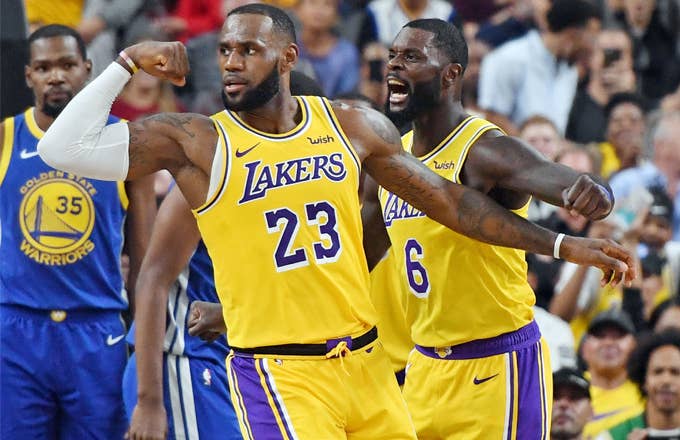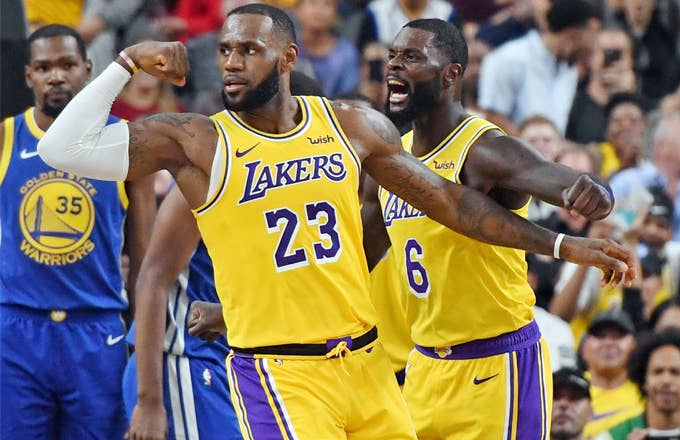
The NFL is losing its footing as “America’s Sport.” Last season’s Super Bowl, which featured two teams with rabid fan bases in the Eagles and the Patriots, was the league’s least-viewed since the Steelers and the Cardinals faced off in 2009, according to the Wall Street Journal. This year’s season opener between the Eagles and Falcons, according to SportsBusiness Daily, was the lowest rated since 2008. Meanwhile, since 2013-2014, the NBA has seen viewership rise each of the last four seasons and the NBA’s average viewer is around 42 years old as compared to the NFL’s average viewer being 50. Football, it feels like, is increasingly losing out to basketball and the reasons are obvious.
I’ve been a football fan and a Giants fan for as long as I can remember. I worshipped Lawrence Taylor and had a LT poster on my wall as a kid (I wasn’t really privy to his off-the-field behavior at the time.) I was obsessed with No. 56 and still think he, Michael Vick, and Deion Sanders are the greatest football players to ever live. But now with the NFL’s alleged attempts at covering up CTE, which included a congressional report saying the league tried to influence a government study, their handling of Colin Kaepernick’s protest, the way it treats its current and former players, and all the off the field behavioral issues it tries to sweep under the rug, the sport is seeing a sharp decline in youth participation. A program in Chicago had to shut down after only 11 kids signed up to play as opposed to the program’s peak of 150. In New Jersey, another program saw a sharp decline as well with about 70 kids signing up this year, compared to around 150 four years ago.
It’s tough to watch NFL games when it’s always been more concerned with protecting “The Shield” than players’ health. They don’t give a fuck about the safety or the future of its disgruntled, unhealthy, and easily replaceable workforce. The league has tried to disassociate itself from damning CTE studies, it’s botched the handling of punishment for players accused of domestic violence cases, and they’re forever cutting players from teams instead of paying them. A middle of the road NBA player gets more guaranteed money than many NFL stars. That’s insane. Fans notice that sort of thing.
Then there’s Colin Kaepernick’s absence, stemming from his national anthem protest, which continues to haunt the league. And now, the NFL seems to be diametrically opposed to Nike—the company that’s been providing the league’s uniforms—over its recent ad campaign featuring the former San Francisco QB.
Kaepernick, the man who started the wave of national anthem protests in the NFL several seasons ago, is 30 years old and still doesn’t have a job, even though he’s easily a top 15 quarterback. Fans believe he’s being blackballed. So does he, considering he filed a lawsuit against the NFL accusing them of collusion to keep him from getting signed. Kaepernick’s former teammate, Eric Reid, just got a one-year deal with the Carolina Panthers and he kneeled during the national anthem his first game back. And guess what? The world didn’t end. Whether you want to call the recent phenomenon of engaging activism, clearly younger fans care about the struggles of oppressed people. This younger generation of sports fan also understands that Kaepernick was never protesting the flag or the anthem. It was always about police brutality and the systemic oppression of minorities. Not about disrespecting the troops.
The NFL went above and beyond this past off-season when they installed a new national anthem policy only to go back on their dumb ass rule when it was ridiculed. While the NBA has had a rule in place that requires players to stand for the anthem for years, NBA commissioner Adam Silver and a few team owners have encouraged players to speak up about social issues and have said they’d be willing to deal with a player’s “anthem protest” on a case-by-case basis. NFL players, on the other hand, are more likely to be fined and deemed a distraction if they voice their opinions about social issues. They’d never be able to wear hoodies in unison and post it on social media, the way the Miami Heat did after the Trayvon Martin aftermath. There are numerous examples since then in which NBA players have been the voice of the people on the floor, in front of cameras, on national television like when Derrick Rose wore an “I Can’t Breathe” t-shirt after the Eric Garner murder or when Melo, Wade, CP3, and James spoke out during the ESPYs. This generation of NBA players are more Bill Russell than they are Michael Jordan in that regard and, with today’s social climate, fans appreciate the sentiment.
Then there’s how the NFL handles the way the game is shared online, which is one of the biggest examples of how the most powerful sports league in America can never do the right thing. Embracing social media has allowed the NBA to become a year-round sport, basically kicking the NFL off that pedestal. Fan engagement online doesn’t compare between the sports because the NFL doesn’t allow for videos, pictures, or GIFs to be shared by social media users. The NBA, on the other hand, is far less judicious. If you want to make a highlight video, or a GIF of a dunk, they don’t care. The NBA views this as free advertising. Social media has made the NBA the best league in the world. And the turning point was in 2013 when DeAndre Jordan dunked Brandon Knight into another dimension of Internet memeability. NBA social media engagement is so prevalent and robust, The Ringer were able to make a massive NBA meme bracket. No other American sport can provide enough content to make a post like that possible.
In an interview with Strategy-Business.com, Silver had this to say about fans and social media:
“We analogize our strategy to snacks versus meals. If we provide those snacks to our fans on a free basis, they’re still going to want to eat meals—which are our games. There is no substitute for the live game experience. We believe that greater fan engagement through social media helps drive television ratings.”
So far the “snacks equals meals” strategy has worked.
The NBA also benefits from an embarrassment of riches in terms of star power and the league obviously does a way better job of letting their faces be seen and their off-court personas celebrated. Their outfits and sneakers are put under a microscope before games, everybody shares Steph Curry’s pregame rituals, fans respect LeBron James’s music choices when he debuts something on his social platforms, and petty social media spats between superstars are treated like reality TV. The NBA comes across as more human, more real, while the National Football League still has this archaic, conservative military-like way of doing things and it’s been slowly eating away at their brand over the years. NBA fans are even tuning in despite super teams "ruining the sport." Finals viewership has nearly doubled since 2007, the NBA lowest viewed in history, clocking in at 9.3 million. Last year's matchup, featuring a stacked Warriors team against a Kyrie-less Cavs team, drew around 17 million viewers a game.
From the Jam Session days to Ahmad Rashad’s Inside Stuff to the marketing of Michael Jordan to MTV’s Rock N Jock basketball games to the way Allen Iverson dressed, the NBA has been able to talk to my generation like no other American major sport league. A perfect recent example is the Toronto Raptors naming native son Drake the team’s global ambassador and even having a ‘Drake Night.’ These days, instead of programming, the league is using social media (and rap, like always) in order to communicate to a younger audience without talking down to it. This is as much a celebration of Adam Silver’s forward thinking as much as it is a slight of David Stern and the dress code he put in place after the Malice at the Palace. Luckily, that dreaded dress code and the the betting scandal of 2007 are the biggest chinks in the NBA’s armor when it comes to PR disasters in recent years. The NFL could only wish for those types of problems.
It may take the NBA a while to match the NFL ratings wise, but we have to remember that pro football is played only a few days a week. So higher ratings for big games are natural. As the NFL tries to figure out how to remain relevant, and how to speak to a younger generation it should follow the NBA’s lead by embracing hip-hop and social media as ways to talk to this new generation. The NBA is running circles around the NFL and every other league in the U.S. right now. Soon enough, we’re going to call basketball America’s sport. As far as I'm concerned, we should start now.

